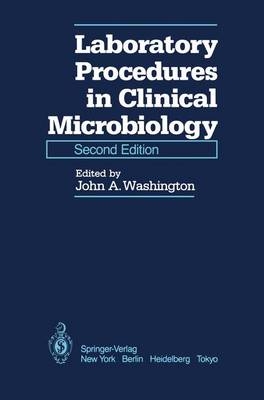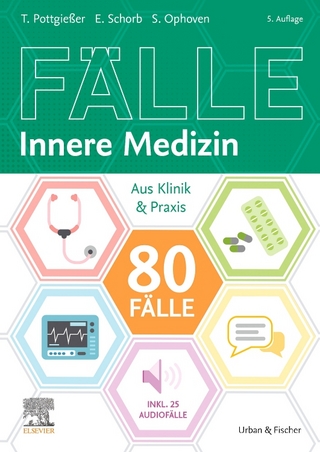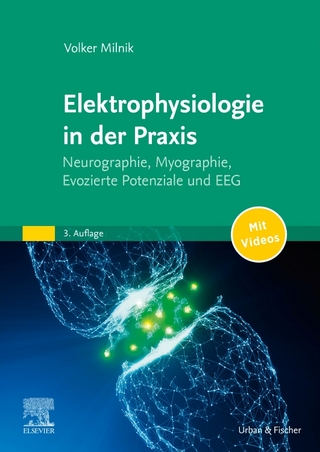
Laboratory Procedures in Clinical Microbiology
Springer-Verlag New York Inc.
978-0-387-96087-6 (ISBN)
- Titel ist leider vergriffen;
keine Neuauflage - Artikel merken
Although there are a number of comprehensive books in clinical micro biology, there remains a need for a manual that can be used in the clinical laboratory to guide the daily performance of its work. Most of the existing publications provide detailed and precise information, for example, by which a microorganism can be characterized and identified beyond any doubt; however, the number of tests involved in this process exceeds the capabilities and resources of most clinical laboratories and are irrele vant for patient care. It is, therefore, necessary in any clinical laboratory to extract from reference manuals, textbooks, and journals those tests and procedures that are to be used to complete the daily workload as efficiently and accurately as possible. It is also essential in the clinical laboratory to determine, on the basis of the kind of specimen being exam ined, which microorganisms are clinically relevant and require isolation and identification and which should either be excluded selectively or simply regarded as indigenous flora and, therefore, not specifically identi fied. Cost and time limit a laboratory's resources, and priorities must be established for handling the workload. The procedures described in the second edition of this manual are those selected by our staff for use in the clinical laboratory on the basis of clinic l relevance, accuracy, reproducibility, and efficiency. Alternative procedures, when considered equivalent on the basis of personal or pub lished experience, have been included where appropriate."
1 Collection and Handling of Specimens.- I. General Considerations.- II. General Instructions for Specimen Collecting.- III. Specific Guidelines for Specimen Collection.- References.- 2 Direct Examination of Specimens.- I. General Considerations.- II. Specific Indications.- III. Stains and Wet Mount Preparations.- References.- 3 Initial Processing for Cultures of Specimens.- I. Blood Cultures.- II. Cultures of Normally Sterile Body Fluids, Tissue, Wounds, and Abscesses.- III. Cultures of Specimens from the Upper Respiratory Tract.- IV. Cultures of Specimens from the Lower Respiratory Tract.- V. Cultures of Urine.- VI. Cultures of Feces.- VII. Cultures of Genital Tract Infections.- VIII. Cultures of Integumentary Infections.- IX. Cultures of Material for Epidemiological Purposes.- References.- 4 Aerobic and Facultatively Anaerobic Bacteria.- Section 4.1 General Classification of Bacteria.- Section 4.2 Identification of Aerobic and Facultatively Anaerobic Bacteria.- I. Gram-Positive Cocci.- II. Gram-Negative Cocci.- III. Gram-Positive Bacilli.- IV. Gram-Negative Bacilli.- References.- Section 4.3 Fluorescent Antibody Procedures and Counterimmunoelectrophoresis.- I. Overview.- II. Fluorescent Antibody Techniques.- III. Counterimmunoelectrophoresis.- References.- Section 4.4 Antimicrobial Susceptibility Tests of Aerobic and Facultatively Anaerobic Bacteria.- I. Overview.- II. Preparation of Antimicrobial Solutions.- III. Testing Procedures.- References.- 5 Anaerobic Bacteria.- I. General Considerations.- II. Isolation of Anaerobic Bacteria.- III. Identification of Anaerobic Bacteria.- IV. Antimicrobial Susceptibility Testing of Anaerobic Bacteria.- References.- 6 Mycobacteria and Nocardia.- I. General Considerations.- II. Identification.- III. Antimicrobial Susceptibility Testing.- IV. Common Aerobic Actinomycetes.- References.- 7 Fungi.- I. General Considerations.- II. Identification of Yeasts.- III. Definitive Tests.- I. Identification of Filamentous Fungi.- II. Serodiagnosis of Fungal Infections.- III. Antimicrobial Susceptibility Tests of Fungi.- References.- 8 Chlamydiae.- General Considerations.- Cultures for Chlamydia.- References.- 9 Mycoplasmas.- I. General Considerations.- II. Identification.- References.- 10 Viruses.- I. General Considerations.- II. Processing of Specimens and Cultures.- III. Cell Cultures.- IV. Identification of RNA-Containing Viruses.- V. Identification of DNA-Containing Viruses.- VI. Reporting of Viral Isolates.- VII. Viral Serology.- References.- 11 Parasites.- I. General Considerations.- II. Procedures Suggested for Use in Examination of Clinical Specimens for Parasitic Infection.- III. Processing of Stool Specimens.- IV. Examination for Blood and Tissue Parasites.- V. Examination of Specimens Other Than Feces and Blood.- VI. Serology for Parasitic Diseases.- VII. Miscellaneous Procedures.- References.- 12 Special Tests of Antimicrobial Activity.- Section 12.1 Antimicrobial Assays.- I. Overview.- II. Bioassays.- III. Liquid Chromatographic Assays.- References.- Section 12.2 Bactericidal Tests.- I. Minimal Bactericidal Concentration (MBC).- II. Serum Antibacterial Titer (SIT) and Serum Bactericidal Titer (SBT).- III. Combination Studies 739 References.- References.- Appendix A Laboratory Safety.- I. Introduction.- II. Routes of Laboratory-Acquired Infections.- III. Dangerous Chemicals.- IV. Procedures following Exposure or Accident.- V. Guidelines for Prevention or Containment of Contamination, Biohazards, and Infectious Agents.- VI. Environmental Control.- VII. Occupational Health 765 References.- References.- Appendix B Media and Reagents.- I. Media for Aerobic and Facultatively Anaerobic Bacteria.- II. Media and Reagents for Anaerobic Bacteria.- III. Media and Reagents for Mycobacteria and Nocardia.- IV. Media for Fungi.- V. Media, Reagents, and Buffers for Chlamydiae, Mycoplasmas, and Viruses.- References.- Appendix C Quality Control.- I. Overview.- II. Media and Reagents.- III. Equipment.- References.
| Verlagsort | New York, NY |
|---|---|
| Sprache | englisch |
| Gewicht | 1685 g |
| Themenwelt | Studium ► 2. Studienabschnitt (Klinik) ► Anamnese / Körperliche Untersuchung |
| Naturwissenschaften ► Biologie ► Biochemie | |
| Naturwissenschaften ► Biologie ► Genetik / Molekularbiologie | |
| Naturwissenschaften ► Biologie ► Zellbiologie | |
| ISBN-10 | 0-387-96087-2 / 0387960872 |
| ISBN-13 | 978-0-387-96087-6 / 9780387960876 |
| Zustand | Neuware |
| Informationen gemäß Produktsicherheitsverordnung (GPSR) | |
| Haben Sie eine Frage zum Produkt? |
aus dem Bereich


